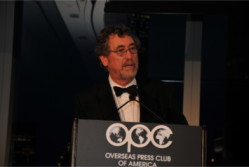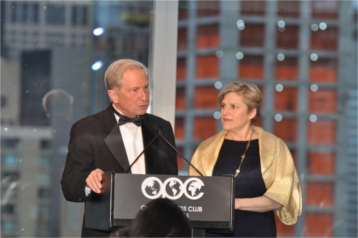Event Coverage Highlight

Dangerous and Challenging Reporting Honored by OPC
By Trish Anderton
Foreign correspondents gathered to celebrate a year of powerful reporting on the world’s most pressing issues at the Overseas Press Club’s Annual Awards Dinner on April 28.
The pioneering PBS documentary series FRONTLINE won two awards, and its founder, David Fanning, was honored with the President’s Award for lifetime achievement. The Associated Press, the International Consortium of Investigative Journalists, Foreign Policy, Reuters and The New York Times also took home multiple prizes.
“This work is more vital every day even as it is more dangerous and yet we—you—do it every day,” said OPC President Marcus Mabry, opening the festivities at the Mandarin Oriental Hotel in Manhattan.
“You confront slaveholders and corporations that abandon their own ideals. You confront governments and you confront terrorists in the field — and sometimes even in our offices,” he added. “In carrying out our mission and adapting it for these times, we continue a proud tradition—a tradition embodied by the giants of our profession, who dared to challenge the world to be better.”
The impacts of terrorism and the plight of refugees were among the biggest stories of the year.
“I would like to dedicate this award to every single refugee I came across last year—people oppressed by wars and social injustice,” said Mauricio Lima, winner of the John Faber Award. Lima shared the honor with three New York Times colleagues—Sergey Ponomarev, Daniel Etter and OPC member Tyler Hicks—for their photographs of Syrian refugees. He went on to speak with obvious emotion about the Majid family, who “accepted for 29 days a stranger with a camera as part of their family” while they traveled from Greece to Sweden to seek asylum.
The Investigative Reporting Award went to Erika Solomon, Sam Jones, Ahmad Mhidi and Guy Chazan of the Financial Times for the series, “ISIS, Inc.” Erika Solomon spoke about their struggle to capture the moral complexity of the story’s landscape.
“I believe that reporting this series was not just about numbers or confirming the fear that is so easy to feel when we write about jihadi groups,” she said. “For me it was really about the insight we got into the lives of very normal people who get caught up in chaos: a young man so desperate to feed his family that he would take a job at an ISIS-run gas plant or a courageous aide worker who keeps fueling his drills with ISIS oil so he can pull victims out of bombing wreckage.”
Solomon said she hoped the series succeeding in showing “how so many people are not simply criminals or victims: they’re just the real human face of war—people with impossible choices.”
For some winners, that landscape of impossible choices is also home.
“My country is dying,” said Najibullah Quraishi of FRONTLINE, accepting the Edward R. Murrow Award for the episode ISIS in Afghanistan. “As you have seen from our film, the next generation is in incredible danger. Education these days is becoming how to use weapons, how to behead, and how to blow yourself up.”
Quraishi, who shared the award with Jamie Doran and Raney Aronson, added this plea: “When you sit down on Monday to decide which stories you will cover, please don’t forget Afghanistan.”
David Fanning, who founded FRONTLINE in 1983 and is now executive producer at large for the show, reminisced about growing up in the 1950s in a small town in South Africa—a country that did not allow television until the 70s. He credits the books his mother brought home from the local library with kindling his desire to know the world. That spark eventually led him to journalism.
“There is a wonder to this business, a privilege: the license granted to be curious,” he said. “And with it, an obligation to the purpose.”
Over the years, FRONTLINE has filed in-depth reports on everything from U.S. criminal justice system, to the Iraq invasion, to unsafe conditions imperiling American workers. In addition to numerous OPC Awards, the show has won 18 Peabody Awards and 75 Emmys.
“The ideas, the concerns and the purpose that the Overseas Press Club represents is at the very heart of FRONTLINE,” said Fanning. “I don’t have to tell you what you already know: that if we want to understand who we are, we have to know how we live and how the rest of the world has to survive.”
Several award winner expressed heartfelt thanks to the people they wrote about.
Molly Webster of RadioLab shared the Lowell Thomas Award with Jad Abumrad and their team. Their story, done in partnership with Israel Story, was about women in Asia who, in Webster’s words, “seem to be supplying the rest of the world with babies” for adoption.
“These women, you never actually hear their own voices. And so it was an amazing honor to be able to find women on the ground in India and Nepal and have them trust us to record their voices,” said Webster.
When The Associated Press decided to tackle what Esther Htusan called the “open secret” of slavery in the Southeast Asian seafood trade, the reporting team fretted about how to produce a story that would seize people’s attention. Later, as they began connecting with people who had been enslaved for decades, they realized that goal was too modest.
“They wanted to be interviewed, they wanted their stories to be told. When we slept at night they’d knock on our door,” recalled Htusan’s colleague, Robin McDowell. “They would call off the sides of the trawlers when we pulled up, trying to pass messages, saying ‘Our families, please tell our families we’re alive.’
“So at that point it wasn’t just about making a link to the American dinner table and getting Americans outraged. We wanted to help find a way to make the story so powerful that these men would be rescued.”
Mission accomplished—at least partly. More than 2,000 enslaved workers have been freed since the story went to print. But according to one UN study, over half of the workers in the Burmese seafood industry alone are enslaved.“I think we still feel that there’s a lot that we still need to do,” said Htusan.
Htusan and McDowell shared the Malcolm Forbes Award and the Hal Boyle Award with Martha Mendoza and Margie Mason. A few days earlier, the series won a Pulitzer.
Many awardees thanked their employers and editors for supporting their efforts. “Writing or photo editing or going about whatever your work is sometimes feels like an ongoing conversation with every good editor you’ve ever had,” said Christina Larson of Foreign Policy while accepting the Morton Frank Award.
Last year’s Annual Awards Dinner featured an impromptu tribute to Jason Rezaian of The Washington Post, who at the time was imprisoned in Iran. This year Rezaian himself came to light the Candle of Concern for journalists killed, injured or missing; he was freed in mid-January after spending more than a year in captivity.
“So thankful for @jrezaian being here,” tweeted Marcus Mabry.
Patrick Chappatte of The International New York Times won the Thomas Nast Award for editorial cartooning. Last year was, of course, a year of particular anguish for political cartoonists; in early January, two gunmen from Al Qaeda in the Arabian Peninsula stormed the offices of Charlie Hebdo in Paris, killing 11 people and injuring 11 others. Chappatte presented a selection of his spare, incisive drawings. He ended with one showing a man preparing to place a flower on a Charlie Hebdo memorial. “Without humor we are all dead,” the man is saying.
Chappatte spoke of the difficulty of cartooning in a digital world where one’s work is instantly accessible to every country and every culture.
“I don’t think we’re going to come up with a global universal sense of humor,” he said, “yet every society needs it more than ever; we need humor to process the horror and atrocities of the world.”
Related Events


